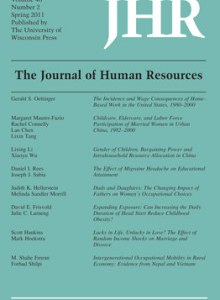
\de Haan\, M., Plug, E. and Rosero, J. (2014). Birth order and human capital development: evidence from Ecuador Journal of Human Resources, 49(2):359--392.
-
Affiliated authors
-
Publication year2014
-
JournalJournal of Human Resources
In this paper we examine the effect of birth order on human capital development in Ecuador. Using family fixed effects models we find positive and persistent birth order effects; earlier-born children stay behind in their human capital development from infancy to adolescence. Turning to potential mechanisms, we find that earlier-born children receive less quality time from their mothers. Additionally, they are breastfed shorter. Poverty plays a key role in explaining these birth order patterns; we observe the largest birth order effects in poor and low-educated families, accompanied with reversed birth order effects in rich and high-educated families.